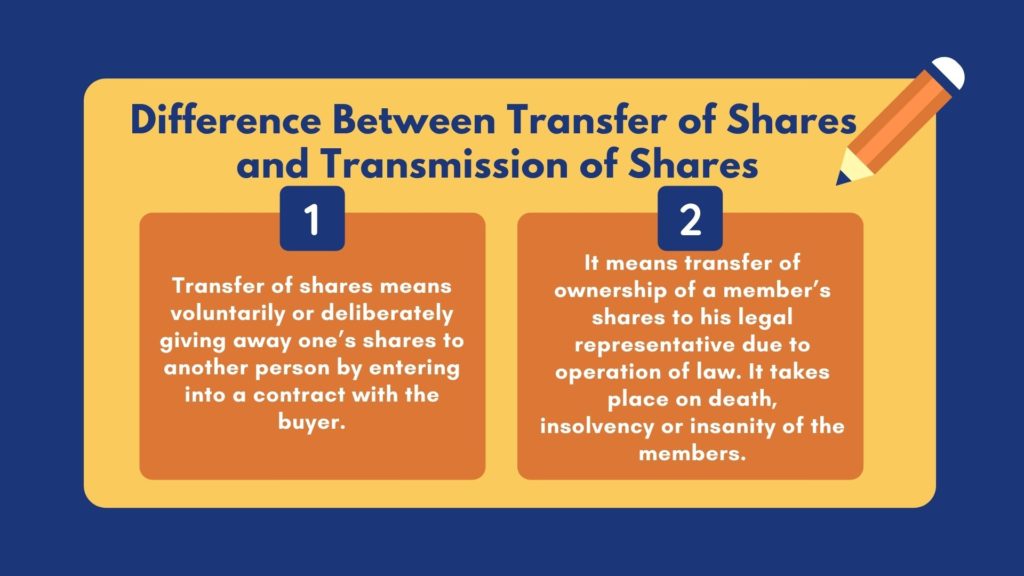Difference Between Transfer of Shares and Transmission of Shares (9 Points)
Table of Contents
Difference Between Transfer of Shares and Transmission of Shares
Meaning of Transfer of Shares
Transfer of shares means voluntary transfer of shares by a member of a company in favour of another person. A member may transfer the shares for consideration or give them away as a gift. Every member has a right to transfer their shares.
In case of public companies, shares are freely transferable subject to the provisions of the Articles of Association. Whereas, in case of Private Company, there are restrictions on free transfer of shares.

Meaning of Transmission of Shares
Transmission of shares takes place due to operation of law i.e. the shares of a member are automatically transferred to another person on the death, insolvency, or insanity of a member. Thus the transmission of shares is an involuntary action. There is only one party i.e. Legal Heir who initiates the process of transmission.
The legal heir or official receiver need not pay any consideration for the shares. Original liability of the member continues in case of transmission. There is no need to submit Instrument of Transfer or pay stamp duty.
- Difference Between Fixed Capital and Working Capital
- Difference Between Owned Capital and Borrowed Capital
- Difference Between Debenture and Share
- Difference Between Preference Shares and Equity Shares
Difference Between Transfer of Shares and Transmission of Shares
| Points | Transfer of Shares | Transmission of Shares |
| 1) Meaning | Transfer of shares means voluntarily or deliberately giving away one’s shares to another person by entering into a contract with the buyer. | It means transfer of ownership of a member’s shares to his legal representative due to operation of law. It takes place on death, insolvency or insanity of the members. |
| 2) When done | It is done when the member wants to sell his shares or give his shares as gift. | It is done when the member dies or becomes insolvent or insane. |
| 3) Nature of Action | It is a voluntary action taken by the member. | It is an involuntary action. It is due to operation of law. |
| 4) Parties involved | In transfer of shares, there are two parties involved- the member who is called as transferor and the buyer who is called as transferee. | There is only one party e.g. the nominee of the member in case of death of the member or the legal representative. |
| 5) Instrument of transfer | Transfer requires Instrument of transfer. It is a contract between the transferor and transferee. | No Instrument of transfer is needed. |
| 6) Initiated by | Transferor initiates the transfer process. | Legal representative or official receiver initiates the process of transmission. |
| 7) Consideration | Transfer of shares is done often by the member to receive some consideration (money) i.e. the buyer has to pay for the shares. (Except given as gift.) | No consideration is involved here. The legal heir or official receiver need not pay for the shares. |
| 8) Liability | The liability of the transferor ends after the shares are transferred. | Original liability of the member continues in case of transmission of shares. |
| 9) Stamp Duty | Stamp duty as per the market value of shares has to be paid. | No stamp duty is to be paid |


